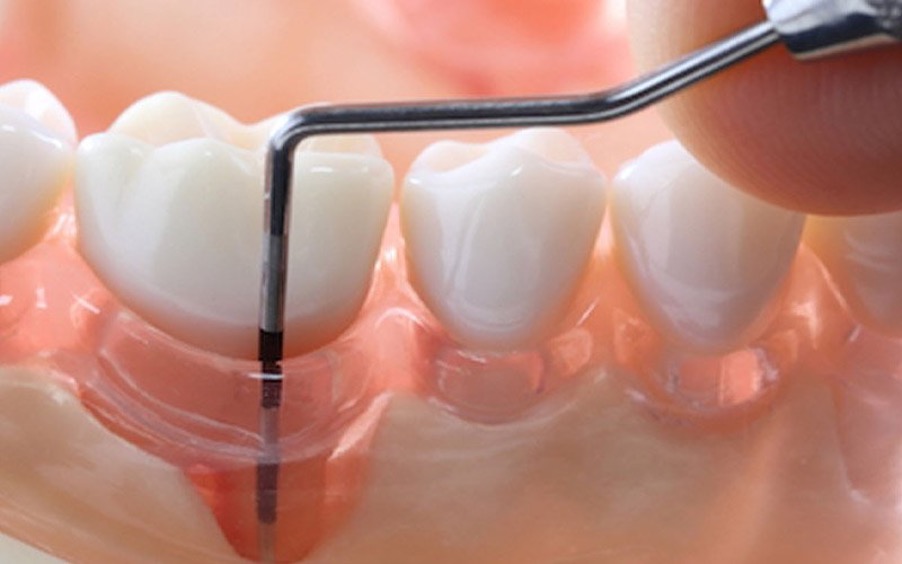Periodontal disease is a common non-communicable disease that causes early tooth loss, eventual pain and suffering and a lower quality of life. Although it begins in the mouth the infection affects several organs and systems of your body.
In this issue, we will discuss the role of a specialist dentist in treating gum disease.
What is a Periodontist?
A periodontist is defined as a dentist who specializes in the prevention, diagnosis, treatment of periodontal disease and in the placement of dental implants. Periodontists receive extensive training, including three additional years of education beyond dental school. Periodontists are familiar with the latest techniques for diagnosing and treating periodontal diseases and are skilled in cosmetic periodontal procedures.
Periodontics is one of 10 dental specialties which encompasses the prevention, diagnosis and treatment of diseases of the supporting and surrounding tissues of the teeth or their substitutes. It includes the maintenance of the health, function and esthetics of these structures and tissues.
The word “periodontal” comes from two words, perio-around and dont-tooth. If we are looking at periodontal problems, we are looking at areas around the tooth or on the outside of the tooth.
Types of Periodontal Diseases:
Gingivitis– the non-painful swelling of the gum tissue without any underlying bone or ligament damage. The gums become red and bleed easily. Gingivitis is often caused by inadequate oral hygiene. This condition is completely reversible with professional treatment and good oral home care.
Factors that may contribute to gingivitis include: diabetes, smoking, aging, genetic predisposition, systemic diseases and conditions; stress, inadequate nutrition, puberty, hormonal changes, pregnancy, substance abuse, HIV infection, and the use of certain medications.
Aggressive Periodontitis- occurs in patients who are generally healthy. Common features include rapid attachment and bone destruction. What is usually unique about these patients are the distinct genetic predisposition that is inherited from a parent to the child.
Chronic Periodontitis- is the most frequent form of periodontal disease. It is the loss of the ligament and bone support anchoring the tooth. It creates a pocket that is occupied by bacterial plaque and calculus. There is usually some recession of the gums in many of these patients. Although common in adults, it can occur at any age. This is usually not reversable, however it can be managed by a periodontist.
Periodontitis, as a manifestation of systemic diseases- often begins at a young age. Systemic conditions such as heart disease, respiratory ailments and diabetes are also associated with this form of the disease.
Necrotizing Periodontitis– is a painful infection of the gum tissue characterized by a rotting effect of the gingival tissues and bone. These lesions are most commonly observed in individuals with systemic conditions such as HIV infection, Covid-19 infections, malnutrition and immunosuppression.
Treating Periodontal Diseases:
When considering treatment choices for periodontal diseases the dentist should be patient centered, least invasive and cost-effective. Today, we are best able to achieve this through non-surgical means. When non-surgical treatment does not achieve the desired result, laser surgery may be indicated to restore periodontal health.
The list below demonstrates possible procedures performed by a Periodontist in managing periodontal disease:
- Nonsurgical treatment (scaling and root planing)
- Dental implants
- Laser treatment
- Regenerative procedures
- Dental crown lengthening
- Pocket reduction procedures
- Gum grafting procedures
- Plastic surgery procedures
We will focus our attention on the most commonly performed treatment- Non- surgical treatment (scaling and root planing).
Scaling and root planing, is a careful deep cleaning of the root surfaces to remove plaque and calculus [tartar] from periodontal pockets and to smooth the tooth root to remove bacterial toxins. It is done with local anesthesia. Scaling and root planing, is sometimes followed by additional treatment such as laser surgery.
Most periodontists would agree that after scaling and root planing, many patients do not require any further active treatment. However, the majority of patients will require ongoing maintenance and recalls (special cleanings) to sustain their great results.
Periodontal diseases are extremely common among the Bahamian population. Despite its prevalence, with proper and prompt treatment along with follow up care patients are able to retain their teeth for a life time.
Dr. Kendal V. O. Major is Founder and CEO of Center for Specialized Dentistry which is a comprehensive family dental practice operating in Nassau and Freeport. He is the first Bahamian Specialist in gum diseases and dental implants since 1989. He also is a certified Fastbraces provider. His practice is located at 89 Collins Avenue, Nassau at (242)325-5165 or [email protected].

A probe is the most important instrument to diagnose gum disease






